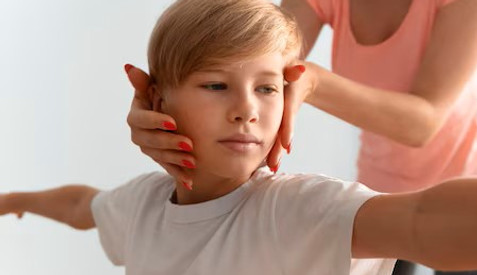
Our Service
PAEDIATRIC PHYSIOTHERAPY
Paediatric physiotherapy, also known as paediatric physical therapy, is a specialized branch of physiotherapy that focuses on the assessment, diagnosis, and treatment of infants, children, and adolescents with physical disabilities or impairments.
Paediatric physiotherapy is a healthcare profession that utilizes evidence-based practice to ensure that infants, children, and adolescents achieve optimal physical function and participation in daily activities.
CONDITIONS WE TREAT IN PAEDIATRIC PHYSIOTHERAPY
NEUROLOGICAL CONDITIONS
-
Cerebral Palsy
-
Down Syndrome
-
Muscular Dystrophy
-
Spina Bifida
-
Stroke
-
Traumatic Brain Injury
-
Autism Spectrum Disorder
-
ADHD
-
Parkinson's Disease
-
Neuromuscular disorders (e.g., SMA, MD)
ORTHOPAEDIC CONDITIONS
-
Clubfoot
-
Scoliosis
-
Kyphosis
-
Lordosis
-
Hip dysplasia
-
Knee injuries (e.g., Osgood-Schlatter)
-
Fractures
-
Osteogenesis imperfecta
-
Musculoskeletal injuries (e.g., sprains, strains)
DEVELOPMENTAL DELAYS
-
Gross motor delay
-
Fine motor delay
-
Language delay
-
Cognitive delay
-
Developmental coordination disorder
RESPIRATORY CONDITIONS
-
Asthma
-
Cystic Fibrosis
-
Bronchiolitis
-
Pneumonia
-
Chronic lung disease
SURGICAL CONDITIONS
-
Post-operative orthopedic surgery
-
Post-operative neurosurgery
-
Craniosynostosis
-
Clubfoot repair
-
Scoliosis correction
OTHER CONDITIONS
-
Torticollis
-
Plagiocephaly
-
Scoliosis
-
Spasticity
-
Ataxia
-
Dystonia
-
Chronic pain
-
Juvenile idiopathic arthritis
-
Postural orthostatic tachycardia syndrome (POTS)
-
Concussions

CONDITIONS WE TREAT
GOALS
1. Improve mobility and function
2. Enhance strength and flexibility
3. Promote developmental milestones
4. Manage pain and discomfort
5. Improve respiratory function
6. Enhance participation in daily activities
7. Support family and caregiver education
TREATMENT TECHNIQUES
1. Exercise therapy (strengthening, stretching, mobility)
2. Manual therapy (massage, joint mobilization)
3. Neurodevelopmental techniques (NDT)
4. Sensory integration therapy
5. Respiratory therapy (breathing exercises, chest physiotherapy)
6. Orthotics and prosthetics
7. Assistive technology (e.g., wheelchairs, walkers)










